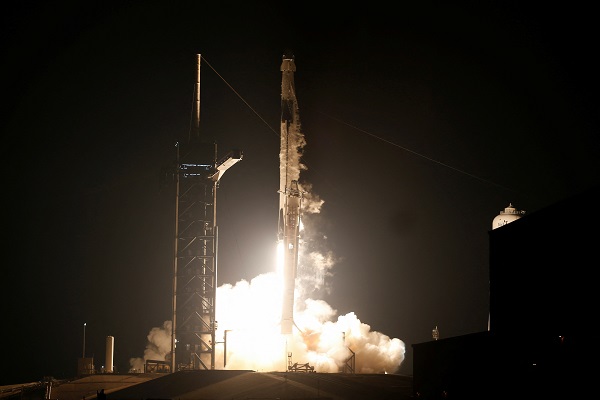 File photo: NASA's SpaceX Crew-6 mission launches to the International Space Station from the Kennedy Space Center in Cape Canaveral, Florida, US, 2 March 2023;
Credit: Reuters/Steve Nesius
File photo: NASA's SpaceX Crew-6 mission launches to the International Space Station from the Kennedy Space Center in Cape Canaveral, Florida, US, 2 March 2023;
Credit: Reuters/Steve Nesius
(Reuters) - A SpaceX Crew Dragon capsule arrived safely at the International Space Station (ISS) after a brief delay early on Friday 3 March 2023, carrying two United States (US) astronauts, a Russian cosmonaut and a United Arab Emirates (UAE) astronaut on a six-month science mission.
The autonomously flying spacecraft dubbed Endeavour docked with the space station shortly after 01:40 EST (07:40 CET) on Friday, about 25 hours after launching from NASA's Kennedy Space Center in Cape Canaveral, Florida.
The coupling was confirmed as the ISS and capsule flew in tandem at 28,164 km per hour about 420 km above Earth across the coast of East Africa, according to a live NASA webcast of the rendezvous.
Docking maneuvers fell behind schedule as the Crew Dragon was making its final approach to the station.
SpaceX ground control teams paused the capsule 20 metres from the ISS for 23 minutes while they verified that all twelve latching hooks used to secure the capsule to the docking port were properly deployed, despite a faulty sensor showing a possible malfunction.
The issue was finally resolved after a software override activated by ground teams.
On arrival, the crew went about conducting a standard series of leak checks and pressurising the passageway between the capsule and the ISS before hatches to the station's interior could be opened, a process expected to take about two hours.
Once aboard, the four-member team faces a busy workload of more than 200 experiments and technology demonstrations, ranging from studies of human cell growth in space to controlling combustible materials in microgravity.
Some of the research will help pave the way for future long-duration human expeditions to the Moon and beyond under NASA's Artemis programme, its successor to Apollo, the US space agency said.
The ISS crew also is responsible for performing maintenance and repairs aboard the station and to prepare for the arrival and departure of other astronauts and cargo payloads.
Designated Crew 6, the mission marks the sixth long-duration ISS team that SpaceX has flown for NASA since the private rocket venture founded by billionaire Elon Musk began sending American astronauts to orbit in May 2020. Elon Musk is CEO of electric car maker Tesla and social media platform Twitter.
The latest crew was led by Stephen Bowen, a 59-year-old one-time US Navy submarine officer who has logged more than 40 days in orbit as a veteran of three Space Shuttle flights and seven spacewalks. Fellow NASA astronaut Warren "Woody" Hoburg, a 37-year-old electrical engineer, computer science expert and commercial aviator designated, was making his first spaceflight.
The Crew 6 mission also was notable for its inclusion of 41-year-old UAE astronaut Sultan Alneyadi, the second person from his country to fly to space and the first to launch from US soil as part of a long-duration space station team.
Rounding out the four-man Crew 6 was 42-year-old Russian cosmonaut Andrey Fedyaev, who, like Sultan Alneyadi, is an engineer and spaceflight rookie.








